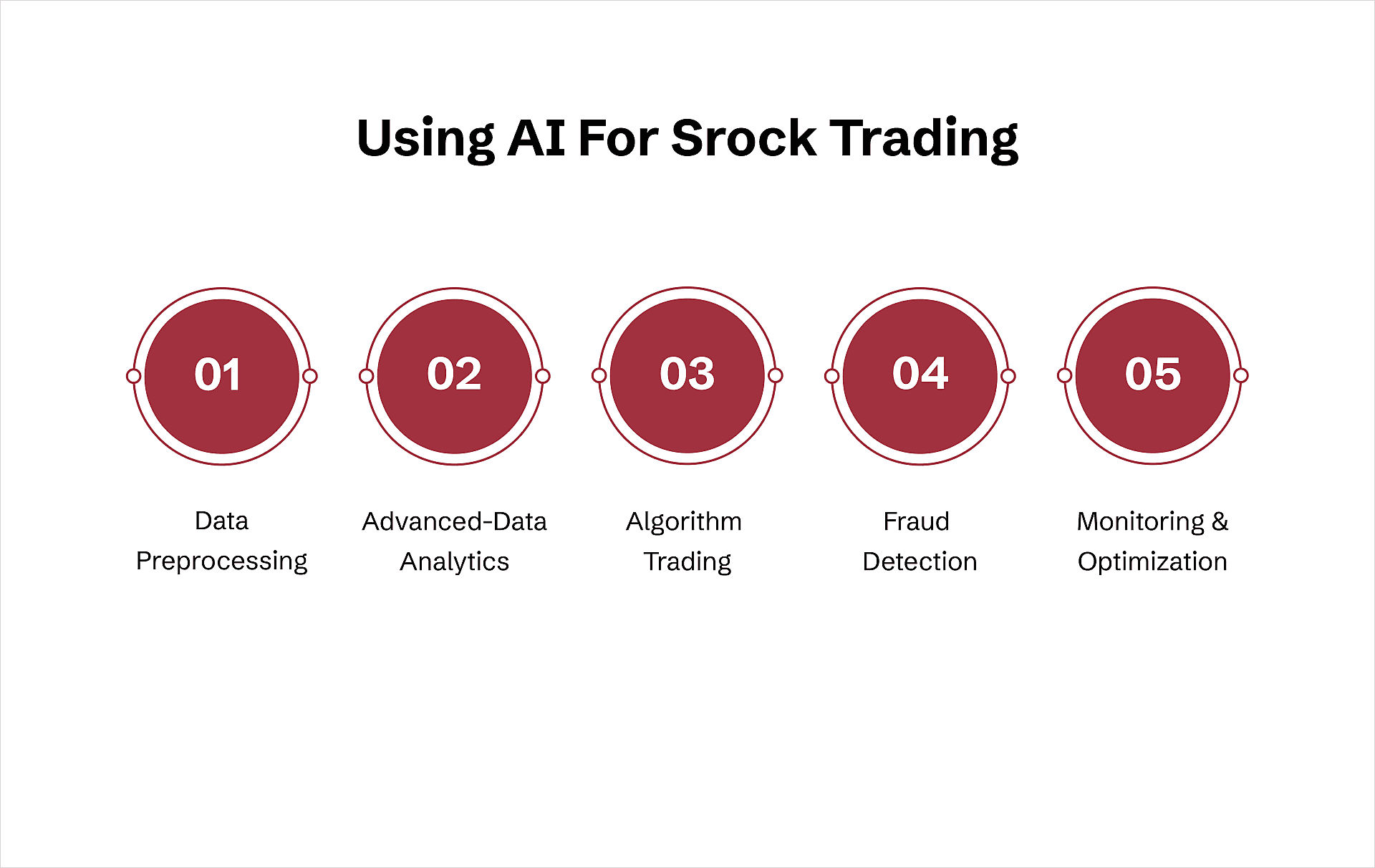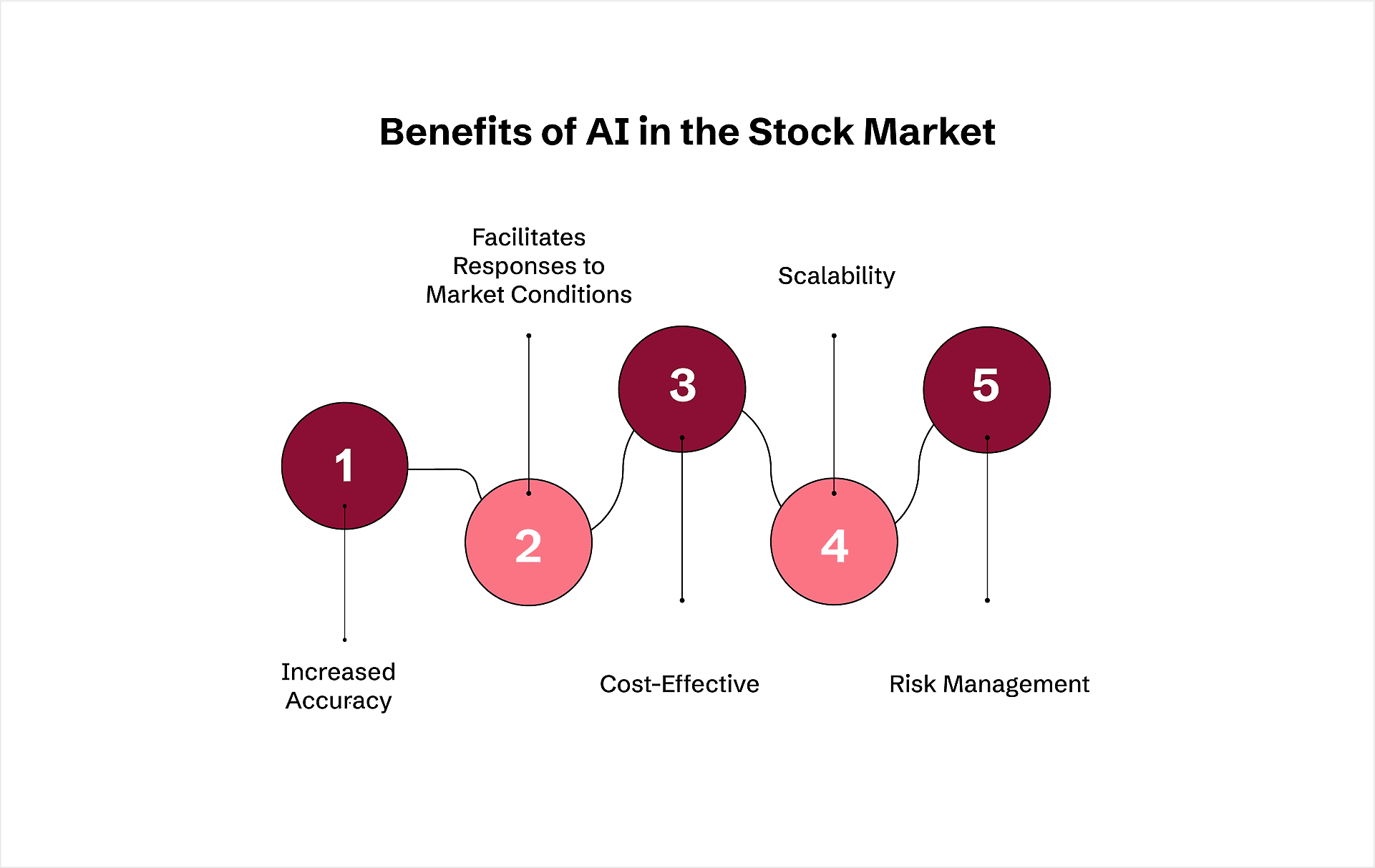
- What is AI-Driven Stock Trading?
- How Does AI Powered Stock Trading Work?
- Advanced Technologies Used in Stock Trading
- How to Use AI for Stock Trading?
- Benefits of AI in the Stock Market
- Use Cases of AI in the Stock Market
- AI Stock Trading vs Human Stock Trading
- Challenges Of AI In Stock Trading
- Concluding Words

Artificial intelligence has significantly transformed many industries since it first emerged. The impact has been both profound and far-reaching, revolutionizing how businesses operate. It has modified the operational landscape and enhanced customer value.
Among various sectors experiencing significant advancements through AI integration is stock trading. Artificial intelligence (AI) has transformed how traders approach their work. With AI, they can make better-informed decisions.
As per the report shared by Statista, the market size in artificial intelligence is projected to reach $184 billion in 2024. That means, implementing artificial intelligence in stock trading can upturn your finance business.
The rise of stock trading algorithms is a significant development. It is driven by the top artificial intelligence development companies. The surge of AI in stock trading is due to broader access to new technologies. These technologies include big data and machine learning.
Advanced algorithms analyze vast amounts of financial data. They examine historical stock prices, social media sentiment, and relevant articles. This comprehensive analysis offers traders valuable insights into market trends.
This blog explores the key role of AI in stock trading. We discuss how artificial intelligence is used in trading and outline its different applications. Additionally, we examine the benefits AI brings to the field and consider its future impact.
What is AI-Driven Stock Trading?
AI-based stock trading is also called algorithmic trading. It involves using computer algorithms to execute trades in financial markets. These algorithms in AI-powered stock trading process large volumes of data. They analyze market trends, historical price patterns, and various economic indicators. It identifies patterns and makes trading decisions.
Artificial Intelligence (AI) is becoming more popular in stock trading. It excels at analyzing data swiftly and accurately. Additionally, AI helps some traders automate their trading strategies. This automation allows them to seize market opportunities more effectively.
How Does AI Powered Stock Trading Work?

AI-based stock trading is a leading innovation in the financial industry. AI powered stock trading
gives investors a powerful tool to analyze vast amounts of financial data. This technology helps them make better-informed decisions in real-time.
The points mentioned below further explain how AI-driven stock trading works:
1. Data Processing
To ensure data accuracy, it's essential to clean the traders' gathered information. This involves correcting errors, organizing them properly, and filling in missing values. By doing this, the data pieces align well and complement one another.
2. Data Collection
AI can swiftly integrate data from various finance sources for stock trading systems. This data can include historical price trends and macroeconomic indicators. Additionally, the AI stock trading system can analyze content from news articles and social media sentiment.
3. Feature Extraction
AI's advanced algorithms in stock trading identify factors that cause stock price fluctuations. These factors are examined over a long period to ensure reliability. elements including volume, moving average, and P/E ratios. These elements include volume, moving average, and P/E ratios.
4. Model Training
Machine learning frameworks and algorithms are trained using historical data. This helps them identify patterns in extracted features and stock price movements. As a result, they can predict future trends. This process is explained in the Machine Learning guides.
Advanced Technologies Used in Stock Trading
The increased use of AI in stock trading has an effect on global financial enterprises. According to the report, the global algorithmic trading market size was valued at $2.03 billion in 2022. It is projected to grow from $2.19 billion in 2023 to $3.56 billion by 2030.
Understanding the latest AI technologies in stock trading is crucial. It helps you see why AI is becoming so important in this field.
1. Machine Learning
Machine learning development services enable real-time analysis of large sets of financial data. These services use machine learning algorithms to help traders spot patterns and trends. With this information, traders can make better decisions about their trading strategies.
2. Deep Learning
Deep learning algorithms work with unstructured data like text, audio, and images. They use advanced neural networks that mimic how the human brain operates. These networks help extract meaningful information from complex data sources.
3. Natural Language Processing
Natural language processing enables computers to understand human languages. It is used in various contexts, including news articles and online comments. This technology also allows them to recognize key events that could affect markets. Additionally, it can assess the mood of investors based on text from various sources.
4. Big Data Analytics
Big data development services help analyze large datasets to find market trends and patterns. Traders use sophisticated artificial intelligence (AI) tools like data mining and statistical modeling. These tools can predict price movements and market volatility. They base predictions on historical data and current patterns. Predictive analytics is becoming more important in stock trading.
5. Risk Management System
Integrating risk management systems with AI algorithms helps monitor trading activity. It also allows for assessing potential risks in real time. This combination enhances the accuracy and efficiency of risk analysis.
6. Visualization Tools
These tools enable traders to use AI technology to understand complex data sets. The AI-generated forecasts and insights help professionals make informed decisions in their trading. By using AI, they can analyze patterns and trends more effectively. This leads to improved accuracy and better trading outcomes.
How to Use AI for Stock Trading?

Let’s explore the AI use cases in stock trading marketplaces and how they enhance the role of AI in stock trading.
1. Data Preprocessing
To use AI for stock trading, first compile relevant financial data. This data set covers various factors. It includes market prices and trade volumes. Additionally, it encompasses news items and social media sentiment. In the data preprocessing stage, clean and prepare the data. Remove noise, fill in missing values, and correct any inconsistencies. This calls for the use of methods like outlier removal, imputation, and data cleansing. Ensure consistency and comparability across different attributes. Normalize or standardize the data.
2. Advanced-Data Analytics
AI systems can rapidly process huge amounts of financial data. This helps investors make well-informed decisions. However, the abundance of data can be overwhelming. It can be hard to find and interpret all the information. This complexity may lead to missed opportunities or poor choices.
AI for trading can rapidly search large databases to find patterns and extract information. This capability of the best stock trading apps can significantly impact investment planning. AI-powered tools can help investors better predict market trends and monitor company performance.
3. Algorithm Trading
The financial sector is increasingly interested in developing AI applications. This shift is driven by AI's impact on algorithmic trading, also known as quantitative trading. Algorithmic trading employs mathematical models and predefined rules for quick trade execution. Artificial intelligence (AI) systems can analyze market data and news sentiment to make fast decisions. The AI based finance applications in stock trading also monitor other key market factors to guide their trades.
4. Fraud Detection
Artificial intelligence is significantly improving fraud detection in stock trading systems. AI algorithms identify unusual trading patterns and recognize potential fraudulent activities. These algorithms also detect possible market manipulations, which helps manage trading risks. Advanced AI systems monitor large volumes of data in real-time.
5. Monitoring & Optimization
Monitor the AI model's performance closely during the optimization phase. Adjust trading strategies as needed to align with market fluctuations. Regularly retrain the AI model using updated data, adjusting its parameters as required. This iterative approach ensures the AI model stays effective and adaptable in stock trading. It does this by adapting to changing market trends. With this approach, the model can continue to yield profitable outcomes.
Benefits of AI in the Stock Market

The introduction of AI in stock trading has resulted in various advantages. The technology gives algorithmic traders extra tools to improve their performance. Some of the known benefits of AI in stock trading are:
1. Increased Accuracy
Artificial intelligence can analyze vast datasets much faster than humans can. When applied to stock trading, AI identifies trends and patterns with great precision. This capability allows users to make more informed investment decisions. Additionally, AI can predict future outcomes, which helps guide investment apps and strategies.
2. Facilitates Responses to Market Conditions
The goal is to invest whether you trade FX or equities. Artificial intelligence (AI) in stock trading is changing the industry in significant ways. AI can quickly analyze market trends and make rapid trading decisions. This ability to react quickly is a game-changer for stock trading. These advanced technologies offer a new level of efficiency and accuracy. Knowing when to buy and sell is crucial.
3. Cost-Effective
Incorporating modernized technology, such as AI in stock trading, can automate repetitive tasks. This helps reduce the workload for humans. There might be initial economic implications. However, over time, organizations and investors can cut overhead expenses. They achieve this by utilizing AI in stock trading effectively.
4. Scalability
This iterative approach ensures the AI model stays effective and adaptable in stock trading. It does this by adapting to changing market trends. With this approach, the model can continue to yield profitable outcomes.
5. Risk Management
AI systems can monitor large and diverse investment portfolios to manage risks effectively. AI-based tools can detect various risks in financial markets. They can identify threats like credit risk, which is the danger of a borrower defaulting on a loan. They assess real-time market data to spot these risks early. The AI systems then take appropriate action to reduce the impact of identified hazards.
Use Cases of AI in the Stock Market
| Use Case | Example |
|---|---|
| Portfolio Management | Wealthfront relies on AI to automate the management of investment portfolios. It analyzes market data, assesses risks, and tailors portfolios according to investors' objectives. |
| Designing Stock Algorithms | QuantConnect is a platform for creating, testing, and deploying trading algorithms. It uses real-time and historical market data to help users develop strategies. The platform also provides a range of financial indicators for more detailed analysis. |
| Designing Customer Service Bots | AI-driven chatbots handle various tasks in the finance sector. They can execute orders and alert users to important events. These chatbots also monitor portfolios in real-time, significantly boosting customer service. |
| Sentiment Analysis | AI algorithms assess sentiment in news, social media, and earnings reports. This analysis helps predict market trends and gauge potential stock price fluctuations. |
| Fraud Detection | Nasdaq's SMARTS surveillance system uses AI to keep an eye on trading. It detects possible market manipulation with its advanced machine learning algorithms. |
There are various use cases of AI in stock trading. Some examples of AI in stock trading are here. They demonstrate how artificial intelligence and stock trading work collaboratively:
-
Portfolio Management
AI models have the ability to evaluate past market data and volatility, which may have an impact on returns. They may then make real-time portfolio adjustments to reflect shifting market circumstances. AI-driven algorithms improve overall portfolio performance by suggesting strategies for diversification. Using AI to trade stocks helps to reduce potential risks through a more balanced asset mix.
Wealthfront is a digital platform for managing wealth. It uses AI algorithms to automate portfolio management for its users. The platform applies advanced AI and machine learning techniques to process market data. It also evaluates risk profiles and optimizes portfolios based on investor goals and preferences.
-
Designing Stock Algorithms
Artificial intelligence is increasingly popular in stock trading. Advanced platforms merge real-time market analysis with deep learning technologies. Users can design custom AI-based trading algorithms to automate trades. This allows transactions to occur without human involvement.
QuantConnect is a cloud-based platform for algorithmic trading. The platform enables users to build trading algorithms using advanced technologies. This includes machine learning as well as various types of artificial intelligence. It also allows them to test these algorithms and then implement them in real trading environments. The platform provides access to real-time and historical market data. Users can also leverage various financial indicators to develop complex trading strategies.
-
Designing Customer Service Bots
Artificial Intelligence (AI) is transforming how customer service bots are designed. These AI bots can assist customers with stock trading-related tasks and questions. Integrating chatbot technology allows users to get quick answers to their inquiries. They can also access the latest stock prices, relevant news, and market trends.
Chatbots can automatically perform certain tasks. For instance, they can execute buy and sell orders. They can also alert users to significant events. Additionally, chatbots can monitor portfolio performance in real time. These capabilities highlight why chatbots have become increasingly important in the financial sector.
-
Sentiment Analysis
Sentiment analysis in AI uses algorithms to assess text from various sources. These sources include news articles, social media posts, and other forms of written data. The goal is to determine market sentiment and inform investment choices. In stock trading, sentiment analysis gives investors insights into the market's mood. It indicates if there's a positive, negative, or neutral view on stocks, industries, or the market.
By evaluating news, social media, and earnings reports, AI identifies trends and patterns. This analysis helps detect sentiment shifts that could influence stock prices. These insights enable investors to make more informed decisions.
-
Fraud Detection
Fraud detection is critical to maintaining investor trust and market integrity. AI algorithms play a vital role in detecting and preventing activities like insider trading. They also help identify market manipulation. A practical application of AI in fraud detection is Nasdaq's SMARTS surveillance system. It has been used successfully to catch suspicious trading behavior.
Nasdaq's SMARTS system uses AI algorithms to monitor trading activity in real-time. It evaluates massive amounts of transaction data to detect possible market manipulation. The system can spot unusual trade patterns and abnormal market activity. It relies on advanced machine learning techniques to identify potential regulatory violations.
AI Stock Trading vs Human Stock Trading
While human stock trading relies on human judgment and emotions, AI stock trading is based on data analysis and algorithms.
Let’s see the difference more precisely:
| Aspect | Human Stock Trading | AI Stock Trading |
|---|---|---|
| Decision Making | Relies on human judgment and emotions. | Based on data analysis and algorithms. |
| Speed | Limited by human processing speed. | Executes trades at high speeds, 24/7. |
| Data Analysis | Relies on manual analysis of data. | Analyzes vast amounts of data quickly and efficiently. |
| Scalability | Limited by human capacity and time. | Highly scalable, can handle large volumes of data and trades simultaneously. |
| Adaptability | May struggle to adapt to changing market conditions. | Quickly adapts to changing market conditions and adjusts strategies accordingly. |
| Consistency | Prone to inconsistencies and errors. | Executes trades consistently and accurately. |
| Risk Management | Relies on manual risk assessment. | Utilizes advanced risk management algorithms to identify and mitigate risks. |
Challenges Of AI In Stock Trading

Artificial intelligence (AI) has transformed the field of stock trading. Many firms now use AI for predictive analytics, automated trading, and risk management. These technologies help companies make more informed decisions and manage their risks better. However, the adoption and use of AI in stock trading come with several notable challenges:
1. Data Quality and Availability
AI algorithms rely heavily on data to make informed trading decisions. Data quality issues can greatly impact algorithm effectiveness. These issues include incomplete information, inaccuracies, or outdated data. The lack of high-quality data can lead to less reliable outcomes. Historical and real-time market data often come with a high cost. These data are usually controlled by private entities. This can restrict the amount of data available for analysis and limit research scope.
2. Market Volatility and Unpredictability
Stock markets are naturally volatile and subject to unpredictable changes. Several factors contribute to this variability. These include macroeconomic trends and geopolitical events. Shifts in investor sentiment also play a significant role. AI models often find it challenging to quickly adjust to sudden market movements. Several factors contribute to this variability. These include macroeconomic trends and geopolitical events. Shifts in investor sentiment also play a significant role. The unpredictability of the market presents a significant challenge for AI-driven trading strategies.
3. Overfitting and Model Bias
Overfitting happens when an AI model is too specific to historical market data. It ends up learning the noise rather than recognizing the true trends. This can result in poor performance on new data. Model bias happens when an algorithm leans toward certain results. This can occur because of skewed training data. It often leads to suboptimal trading decisions. Both overfitting and bias highlight the challenges of developing robust AI trading models and automated trading platforms.
4. Latency and Execution Speed
In high-frequency trading (HFT), speed is crucial. Every millisecond counts when executing trades. Any delay in execution can be harmful to trading outcomes. AI systems must operate with extremely low latency to remain competitive. Latency issues can be caused by network delays, processing speeds, and algorithm inefficiencies. These factors can affect the performance of AI-driven trading systems.
5. Regulatory and Ethical Challenges
AI in stock trading operates within a complex regulatory environment. Meeting regulatory requirements like MiFID II in the EU and FINRA in the US is challenging. Ethical issues, such as market manipulation, complicate AI use in trading. These concerns create doubts about fairness and responsible AI practices in financial markets. Navigating these regulatory and ethical challenges requires careful consideration and adaptation.
6. Algorithmic Transparency and Interpretability
AI algorithms, especially deep neural networks, often act like "black boxes." Their internal processes are not clear to users or observers. This lack of transparency can be a problem for traders, regulators, and stakeholders. They need to understand how trading decisions are made. Transparent and interpretable AI models are key to building trust in AI-driven trading. Accountability depends on knowing how these stock portfolio tracker apps work and making decisions.
7. Technology Infrastructure and Costs
Implementing AI in stock trading requires a robust technological infrastructure. This includes powerful computing resources, advanced software, and reliable data feeds. The costs of building and maintaining this infrastructure can be high. This expense can be prohibitive, especially for smaller firms or individual traders. Additionally, the rapid pace of technological advancements necessitates continuous investments to stay competitive.
8. Cybersecurity Risks
AI systems in stock trading are prime targets for cyberattacks. These systems can greatly impact financial markets, making them appealing to attackers. Risks include data breaches, algorithm manipulation, and denial-of-service attacks. Such threats can cause significant harm to AI-based trading platforms. Enhancing AI and cybersecurity measures and safeguarding sensitive data are critical challenges in this domain.
9. Human-AI Collaboration and Oversight
Artificial Intelligence has shown remarkable skills in stock trading. However, human supervision is essential to overcome AI's limitations. Human oversight also reduces the risk of severe failures. Collaboration between human traders and AI systems is vital for effective trading. Robust monitoring practices further support the success of AI-based strategies. Together, these elements lower risk and boost the reliability of AI-driven trading.
Concluding Words
To sum up, AI is transforming stock trading in significant ways. It's changing how traders work and make choices in the financial markets.
Traders now use advanced AI algorithms to process huge volumes of data. These data include historical stock prices, social media sentiment, and news articles. By examining different sources, traders can make more informed choices. This approach also allows them to enhance their artificial intelligence trading strategies.
The adoption of AI in stock trading has led to increased efficiency. It has improved decision-making and boosted profitability for traders. As trading software development advances, its influence on stock trading is likely to grow. This technology is evolving quickly, bringing significant changes to the trading industry. We can expect this impact to broaden and transform how stocks are traded. This trend could mark a new era of innovation and opportunity in the financial markets.
Frequently Asked Questions
-
What is an AI trading system?
-
How to build stock trading AI?
-
How will AI affect stock trading?
-
What are the risks associated with AI for trading?

















